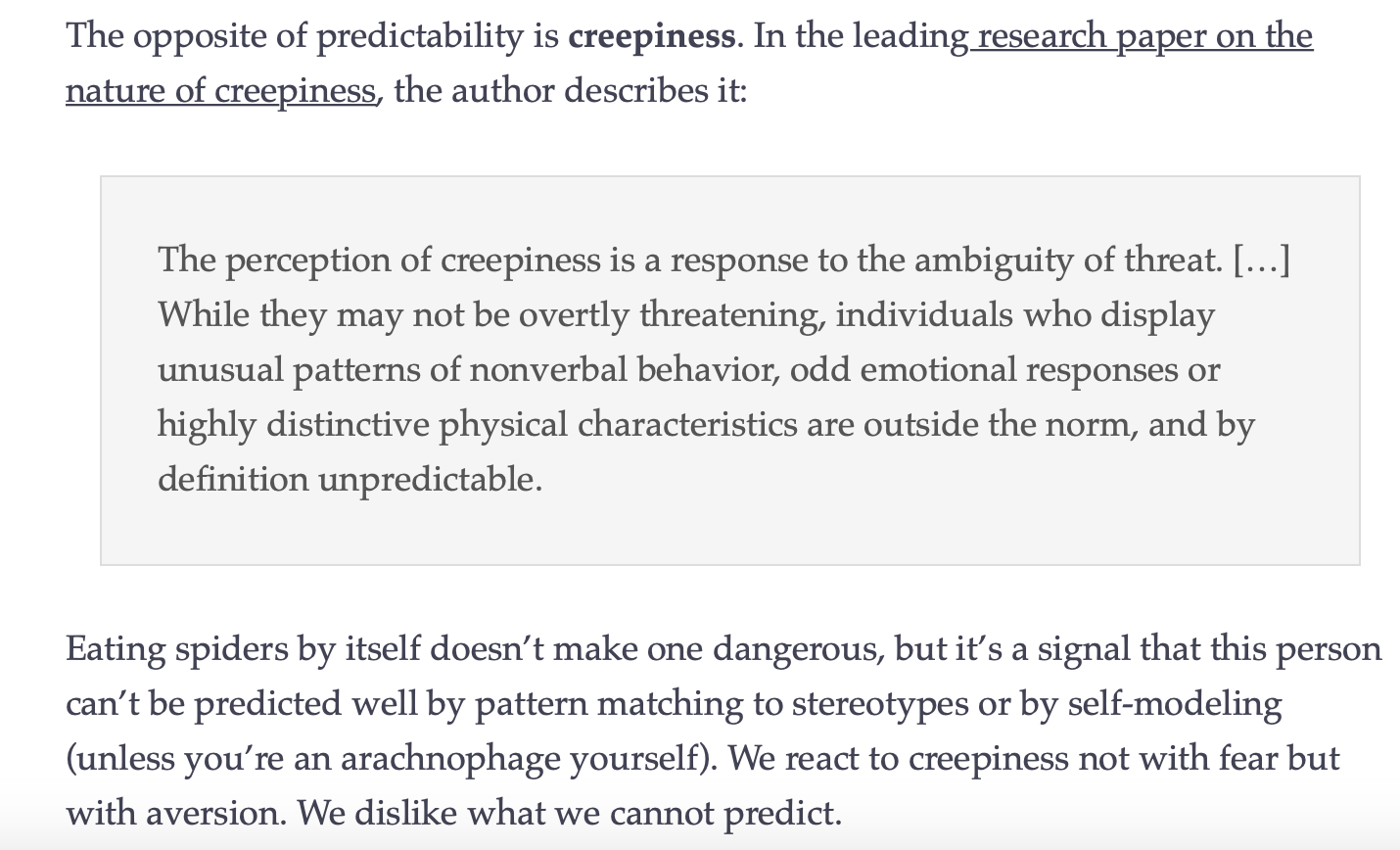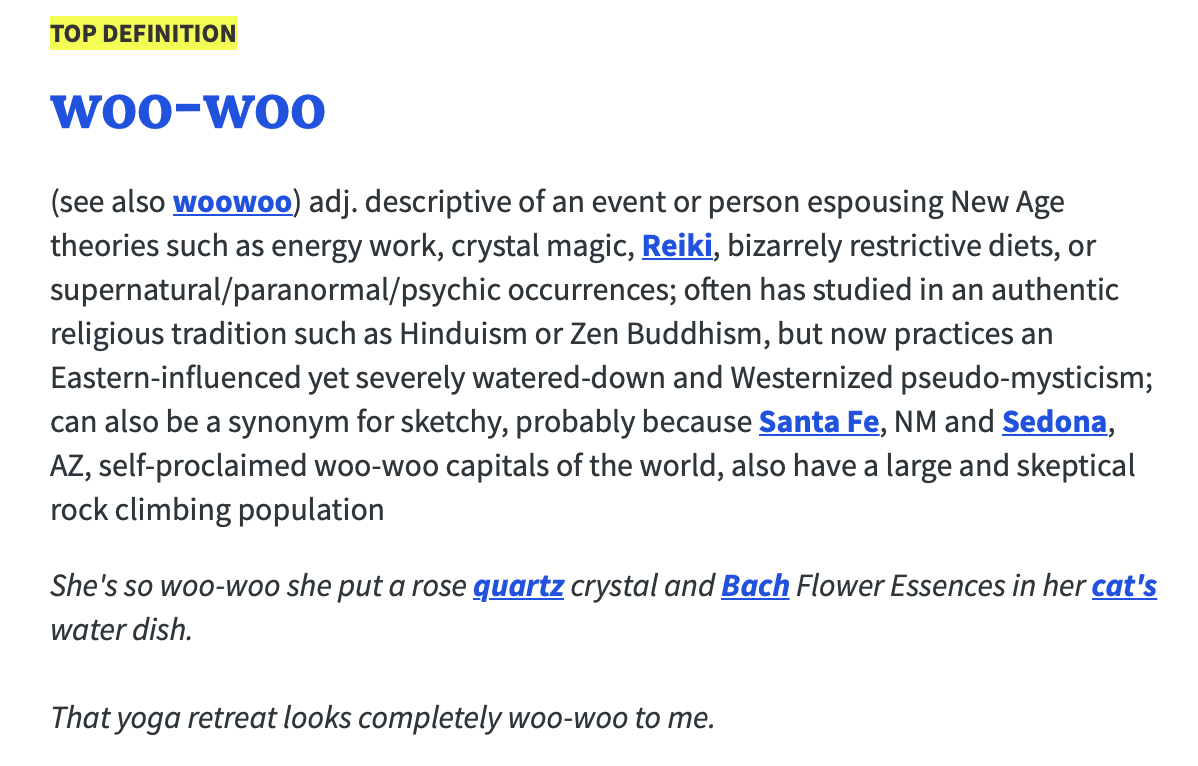What is woo?
“Any sufficiently advanced technology is indistinguishable from magic.”
Woo is advanced psycho-technology that we can’t distinguish from magic—yet.
—
Imagine a Stone Age man. Show him an iPad with FaceTime on it—he will be haunted by this ghostly apparition on your screen. For him, your iPad is indistinguishable from magic.
Rod, as we’ll call him, goes back to his friends. He tells them about this magical iPad he came across. They dismiss him. They think he’s gone insane. Maybe he has. Rod can bring them over to show them the Glorious iPad. They all come and see it, and they can’t deny what’s in front of their eyes either. There has clearly been a consistent, replicable encounter with something that seems magical—impossible to explain in materialist terms given what they know about the word. This is woo.
At this point, they have a couple choices. They can reject their experience, and blow it off as hallucinating, not worth investigating. This is path of mainstream society.
They can accept it blindly, saying iPads are real, and they must work in exactly the way the stranger said they do: by feeding on your soul. This is the path of the woo-woo.
Or they can simply notice their phenomenological experience, not deny the reality of it, content to hold it until and if they ever do merge it with their materialist understanding. This is the path of the woo-wranglers.
—
The thing is: Reality doesn’t wait for understanding to be true.
For better or worse, we seem to have stumbled across knowledge and practices that result in a dramatically altered phenomenology of the world. This may reflect something metaphysical about the inanimate world, it may reflect only something internal and psychological, or both.
We have the iPads in front of us, we’re not crazy, there’s something strange, cool, and entirely explainable going on, and I want to better explore it.
—
So:
> What is woo?
Woo is any set of practices difficult to reconcile with materialist, scientific explanation.
Specifically, any set of practices with effects on humans. This includes religion, energy healing, and talking to aliens, and it excludes unexplained physics or quantum wormholes.
Largely speaking, these practices engage with the phenomenally complicated bodymind in unusual or subtle ways, and often, the metaphysical beliefs they come up with to explain their effects is confused, but their phenomenology is pointing to something.
—
Other things included in woo:
- Yoga
- Religion
- Buddhism
- Chakras
- Auras
- Non-doing
- . . . and so on
—
So much for our working definition.
Before moving on, let’s take a look at how people define the term. Here are some definitions from wikis:

Wikitionary says: “A person readily accepting [exotic] phenomena, or emotion-based beliefs and explanations.”
(Take a note of that word, “accept.” Everything we discuss today will hinge on what exactly we mean to “accept” them.)
Notice also how derogatory the term is. We haven’t even gotten to Urban Dictionary yet. In particular, note the Wikitionary reference to “make a living out of it” and the implicit dismissal of the reporter for being “woo woo”—those who engage in this world must be exploiters or or the exploited.
—
> What is the difference between woo and religion?
The line is thin. Generally, it’s people’s comfort with the topic. We like people who are predictable. Whom we can model.
A little grandma who lights incense to god every night might not be like us very much, but we understand her, we can predict her. The crystal hippie woman who places stones around her house—she creeps us out. She left mainstream society in some way. Why? What else is wrong with her? What happens if there’s a majority of her?
We’re fine getting in a car with strange, Hindi-speaking grandmas—they fit a stereotype—but someone who puts crystals around the house and worships forests, not so much.
As @vgr writes:

Somehow you’ve managed to relate with religious people who literally might think you’re going to hell. But you don’t have a script on how to deal with crystal-dealing hippies. If you grew up around them your entire life, you might think it’s fine.
Buddhism gets a pass as a religion, because its image is familiar and soothing to the Western at this point. South American shamans? Still woo. Not for lack of tradition, or lineage, or mystical claims about reality and cosmic oneness. Just familiarity.
Woo also tends to be more unorganised, modern, less connected to a historical tradition than religion.
> What is the difference between woo and mysticism?
Prejudice. Tradition. Skill.
Take a look at Urban Dictionary’s definition of woo.

There’s a fascinating phrase for you. “Pseudo-mysticism.” There’s a distinction held between woo and “true Eastern mysticism,” still viewed with an awe of reverence. Woo is more New Age hippies, Eat, Pray, Love WASP ladies,
Here, “woo” calls out the shadow in us. Not wanting to be suckered into an exploitative scam. The “true Eastern mystics” still feel connected to tradition, to something worth respecting—they don’t feel “broken.” What rings hollow about Western woo practice for many mainstream people is the sense that there must have been something broken about Western woo practitioners if they didn’t fit into normal society.
Western-centrism note: It’s different in other societies. In India, the “mad guru” or “crazy meditator” is an accepted and even beloved sight on the street and the temples. They are not scary, they are not quite woo.
Having talked about the difference between woo, mysticism, and religion, we’re really beginning to unpack the emotional content of the phrase, which is a deep mistrust and aversion to those who seem broken enough to reject the social contract and eschew all the mainstream groups in favour of something else.
And, as the Wikitionary definition led us too, a sense of exploitation and being exploited. There is a lot to be on guard for in this journey.
—
Here’s one last fun definition I like
“Woo is what happens when you start noticing odd beliefs.”
We are going to discuss some very odd things, and our ability to stay sane, yet open, will hinge on neither accepting, not rejecting, but simply noticing what is happening.
The way our brain usually works (a conscious verbal loop supplanted by emotional intuitions etc.) is not how our brain works in the altered states of consciousness induced by woo practices. So we’re not as sure how to relate to our phenomenology. When we see a psychedelic hallucination, but there’s nothing actually wrong with that. It’s just we can’t take our visual phenomenology to be evidence of physical objects in front of our eyes anymore. We might be able to take them as evidence for deep psycho-emotional content though.
—
See also: Receiving communication from the outside